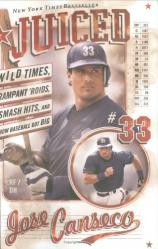Juiced: Wild Times, Rampant 'Roids, Smash Hits, and How Baseball Got Big
Review
Juiced: Wild Times, Rampant 'Roids, Smash Hits, and How Baseball Got Big
Unless you've been living under a rock for the last few weeks, you've heard about Jose Canseco, aka King Rat (at least in the eyes of his fellow professional athletes).
The former Rookie of the Year, Most Valuable Player, six-time all-star, and poster boy for better living through science, returns from his absence in the limelight with JUICED: Wild Times, Rampant 'Roids, Smash Hits, And How Baseball Got Big, a tell-all that names names in an attempt to give steroids a positive spin. Even the dust-jacket features a shirtless Jose, flexing for the camera, smilingly proud that he's pulled off something on everyone: fans, front offices, even the President of the United States (George W. Bush was at one time president of the Texas Rangers when Canseco was a member of that team).
Baseball's reputation as a clean sport was already suffering a black eye from steroid allegations on some of its high-profile players such as Barry Bonds, Jason Giambi and Gary Sheffield. But Canseco goes further, mentioning other teammates, including single-season home run king Mark McGwire, casting aspersions on the legitimacy of his record.
JUICED starts off with what appears to be a legal disclaimer: "This book does not intend to condone or encourage the use of any particular drugs, medicine or illegal substances." Yet the author (there is no collaborator mentioned) spends most of the time doing nothing but continually repeating his assertions that, taken under proper supervision, these drugs can greatly enhance everyday life, above and beyond athletic performance.
"It ain't cheating if you don't get caught," is a popular adage in sports. Several players have been caught, yet they live in denial or childishly claim that it's not a big deal since "everyone does it" and they're just trying to level the playing field.
Canseco goes back and forth between accepting responsibility and claiming that he was "created by the media," in a sense, and just giving the fans what they want.
"Reporters are always talking about objectivity and fairness," he writes, "but who are they kidding, anyway? Everyone knows the media can portray an event however they want, positively or negatively....They can make your career, if they like you, or they can destroy you."
He tries to paint himself as a sympathetic character, too, writing of the time when he was so despondent over his failed marriage with his second wife that he was on the verge of suicide, stopped only when he heard his infant daughter cooing ... from several rooms away in his expansive house.
Canseco also claims that practically every bad thing that ever happened to him was either a misunderstanding, an incident blown out of proportion because of his fame, or totally fabricated.
The book itself is fair for its type: athletes seeking to promote themselves for either a lifetime of achievement or a single moment in the sun. But JUICED has repercussions beyond its literary merit, or lack thereof.
As odious as Canseco comes across, he raises legitimate issues many fans have been asking --- and many baseball executives wish would just go away. For if his charges are true --- if indeed there are scores, if not hundreds, of players who "use" --- how could these supposedly savvy decision-makers, who make their livings evaluating talent spending millions of dollars in salaries (with its impact on fans in the form of increased ticket prices, concessions, parking, etc.), not know what is going on? And if they do know, and cast a blind eye, are they guilty of aiding and abetting the situation?
JUICED has been on the drawing board for a while now, but what better time to finally release it than amid all the news and speculation over steroids?
Whether readers believe Canseco or not is to be determined. On the one hand, his explanation regarding the sudden "ballooning" of suspect athletes makes sense. On the other, why can't we give them any benefit of doubt when they say their improved physiques and concomitant better play are the results of intense training regimens? A pall has fallen over the whole industry; fans will look askance at wondrous feats heretofore falling in the realm of legends.
As one example of the jaundiced eyes that will take in baseball this year, look at Selena Roberts's column in the February 19th issue of the New York Times. She reports that Roger Clemens, the 42-year-old star pitcher for the Houston Astros, noted that he can no longer use Vioxx as his pain reliever of choice. If he fails to live up to past success, will the loss of his customary pain-reliever be a factor --- since athletes are known as creatures of habit and superstition --- or is a cagey veteran making an excuse, a ruse to cover for other "self-medication"?
Cynical? Yes, but this is what recent events, coupled with Canseco's expose, have wrought.
Reviewed by Ron Kaplan (RonK23@aol.com) on January 22, 2011
Juiced: Wild Times, Rampant 'Roids, Smash Hits, and How Baseball Got Big
- Publication Date: February 14, 2005
- Genres: Nonfiction
- Hardcover: 304 pages
- Publisher: William Morrow
- ISBN-10: 0060746408
- ISBN-13: 9780060746407



